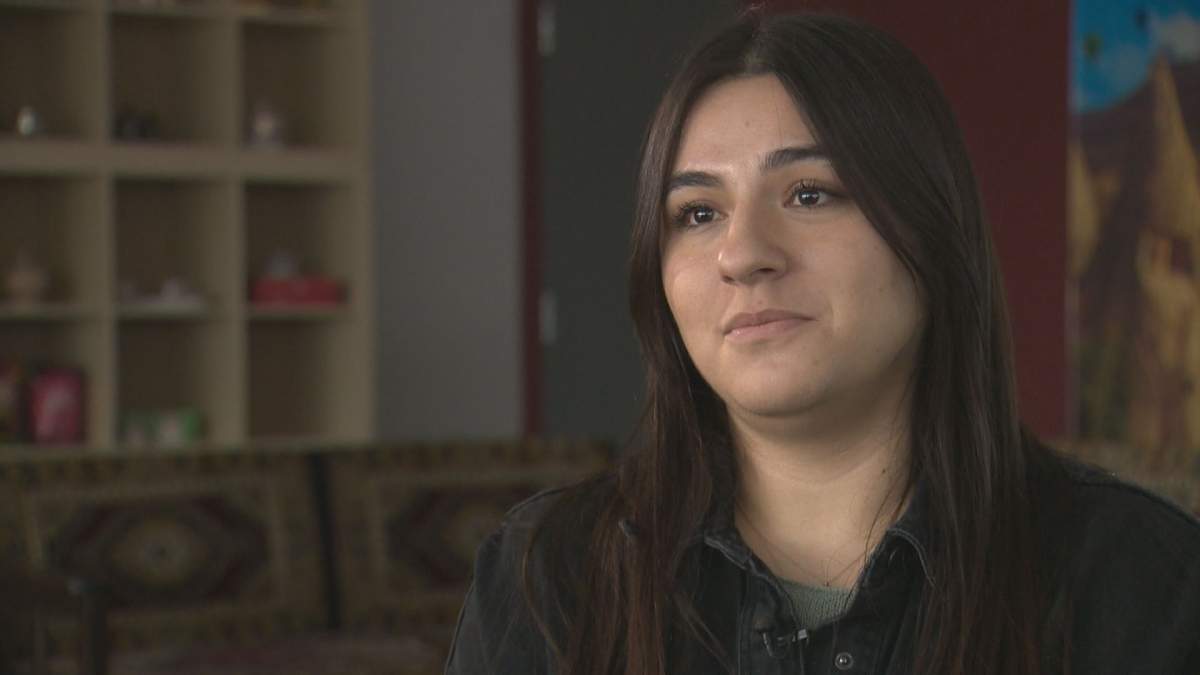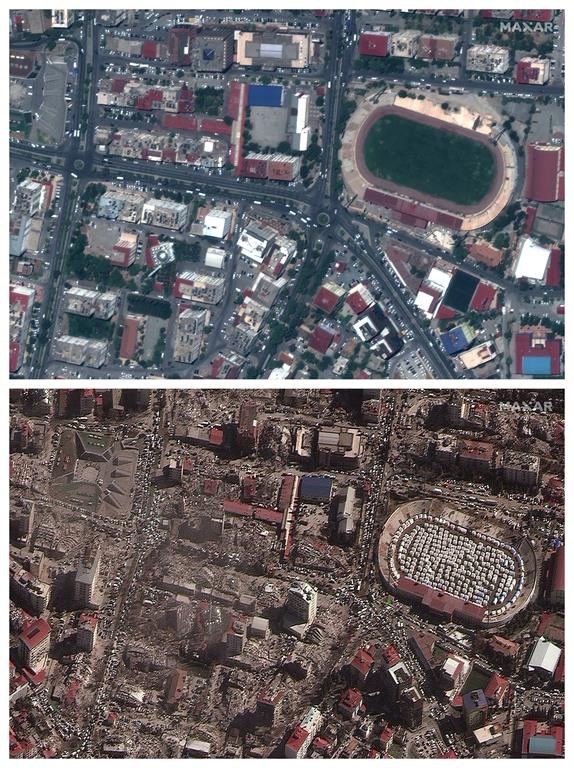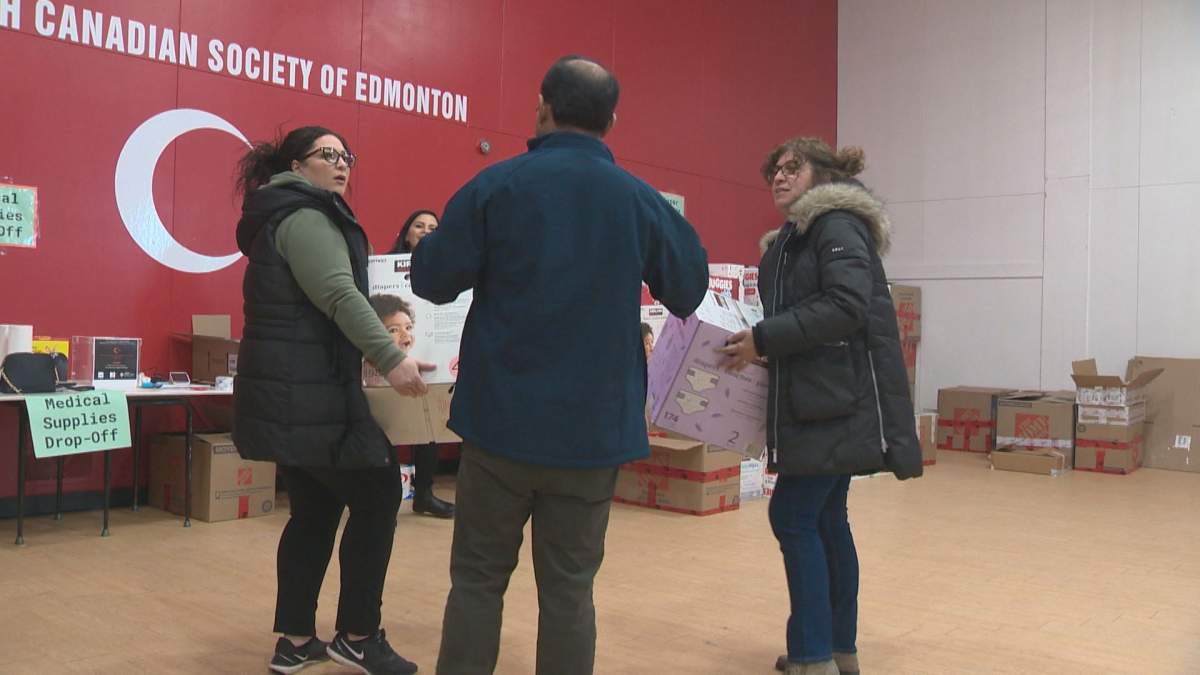The death toll of the earthquakes in Turkey and Syria surpassed 23,000 on Friday as authorities announced the discovery of new bodies, leaving families across the world shattered — including one in Edmonton.

Zeynep Yilmaz is new to the city and found out this week two of her relatives were killed back home, including a younger cousin, when buildings collapsed in Monday’s 7.8 magnitude catastrophe.
“Umut means hope in Turkey. We had hope but we lost it,” Yilmaz said of her cousin.
“He was just seven years old.”
Family tried to save the child after the first earthquake, Yilmaz said, explaining they could see his leg sticking out of the rubble. But then the second quake happened.
“It was too quick and both earthquakes were too big.”
Yilmaz’s aunt also died after being crushed.
“She saved her son, and she saved her husband and she couldn’t save herself,” she said. “It was so quick, so fast. Just the one second and the whole life is gone.”
Yilmaz said buildings in her city were poorly constructed and it wasn’t a secret.
“Turkey is a very dangerous area for earthquakes,” she said. “The buildings were not good.”
“Everyone knows. Every minister knows it. Every president … If earthquake hits Turkey, it will be a mess.”
“I know it’s coming from the gut, but it’s also murder. Because they knew what would happen if (an) earthquake hits,” Yilmaz said.
In Nurdagi, a city of around 40,000 nestled between snowy mountains some 56 kilometers from the quake’s epicenter, vast swaths of the city have been leveled, with scarcely a building unaffected.
Even those that did not collapse were heavily damaged making them unsafe. With the chances of finding people alive dwindling, crews in some places have begun demolishing buildings.
Yilmaz said when the quakes struck, buildings crumbled as if they were made from paper.
“Japan has more earthquakes than us, but they’re still alive because they have good buildings.”
The death toll from Monday’s quake has eclipsed the more than 18,400 who died in the 2011 earthquake off Fukushima, Japan, that triggered a tsunami. It has also surpassed the estimated death toll of 18,000 people lost following a temblor near Istanbul in 1999.
Monday’s earthquake affected an area that is home to 13.5 million people in Turkey – and an unknown number in civil-war-torn Syria – which stretches farther than the distance from London to Paris or Boston to Philadelphia.
Even with an army of people taking part in the rescue effort, crews had to pick and choose where to help.
The scene from the air showed the scope of devastation, with entire neighborhoods of high-rises reduced to twisted metal, crumbled concrete and exposed wires.

Get breaking National news
Yilmaz said her city used to have beautiful buildings but now homes and even hospitals have been reduced to rubble: “It’s all like stones, rocks.”
“It’s like being deleted from the map.”
Yilmaz is new to Canada — she moved to Edmonton from Turkey in June 2022. Her heart aches watching the devastation from afar: “Right now I don’t have any city, my hometown is nowhere.”

It is the same feeling of helplessness for many people who have loved ones suffering in Turkey and Syria.
“Think about these people, no home, no family. They lost everything,” said Muhammet Cetin, who runs Cappadocia Wholesale Turkish Foods in north Edmonton.
The store at 15108 135 Ave., is hoping to make a difference by collecting donations of cash and essential items.
“We are very sad for this because we can do nothing. All we can do is make the donation,” Cetin said.
The store has a donation box set up. The Edmonton Turkish Canadian Society is also working to collect cash and items that are of most use right now.
“Everybody wants to help but we want to make sure we are sending the things that are needed,” said Sim Senol with the society.
She said the organization has been in contact with the Turkish consulate, which has issued a list of specific supplies that are in need right now.
Items like adult and child diapers, baby formula, personal hygiene products and winter camping gear are the focus of a collection this weekend. Those items will be shipped overseas early next week.
“If anybody has winter tents — not the summer ones, it’s cold out there — but winterized kind of tents or sleeping bags, that’s what we’re collecting in the donation centres,” Senol said.
Even though experts say people could survive for a week or more, the chance of finding survivors in the winter freezing temperatures is dimming.
Rescue workers are making a final push to find survivors of the earthquake that rendered many communities unrecognizable and led the Turkish president to declare it “the disaster of the century.”
It’s not clear how many people are still unaccounted for in both countries.
“After Sunday, most importantly, what we’re doing is we’re collecting cash donations to buy medical supplies. That is the long-term need,” Senol said.
She said many survivors, including children, are having to have limbs amputated from being trapped under rubble for so long.
“We’re going to need prosthetics, everything like that. We need a lot of medical supplies.”
“So we’ll collect those, buy those and then send them next week.”
Senol said the organization is also working with an engineer who worked the 2016 Fort McMurray wildfire to source supplies and fundraise to set up field hospitals.
“Those are going to be special targets after the donations because we want to make sure again, the kinds of donations that we collect are going to be helpful in the field,” Senol said.
As of Friday, she said the Turkish Canadian Society has collected about $30,000 in donations but more are needed. The goal is to raise at least $300,000.
Senol said she understands times are tight and so in addition to cash donations, members of the Turkish community have stepped up with food fundraising.
“We’re saying skip Skip the Dishes and order Turkish food the next two weeks or so.”
Volunteers are cooking meals in the Turkish Canadian Society’s kitchen (located at 15450 105 Ave.), to be sold, with funds going to earthquake relief efforts. Delivery is also available. Details are being posted to the organization’s Facebook page.
“Even if you don’t have that much to donate, maybe you can consider rather than eating out or buying groceries this week, get your dinner from the Turkish community and that’s also going to help.”
More details are also available on helpturkiyealberta, an Instagram account launched specifically to get the word out about local fundraising efforts.
Corus Entertainment, the parent company of Global News, is supporting the Humanitarian Coalition in its appeal to help victims of the devastating earthquake in Turkey and Syria. Donations can be made online.
— With files from Justin Spike, Ghaith Alsayed And Zeynep Bilginsoy, The Associated Press











Comments
Want to discuss? Please read our Commenting Policy first.